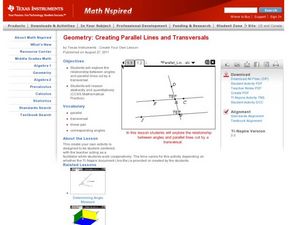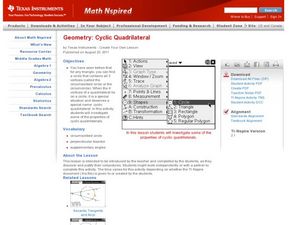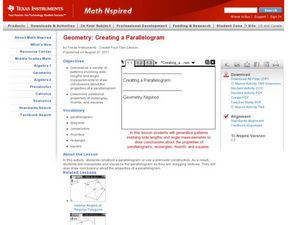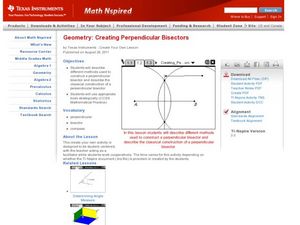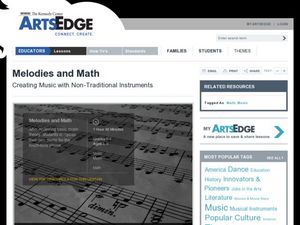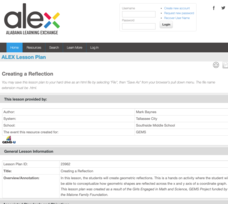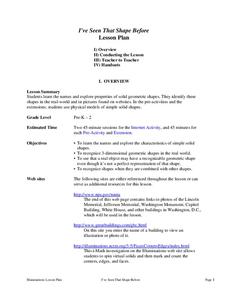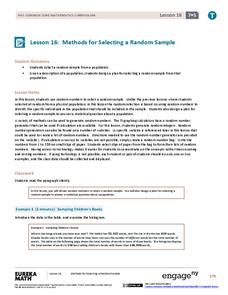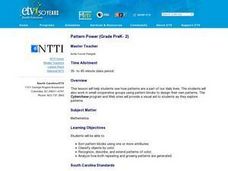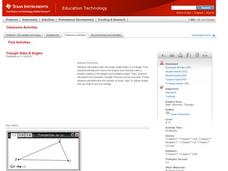Curated OER
Creating Parallel Lines and Transversals
Have your class create parallel lines. Students will learn how to identify the different angles created by a parallel line cut by a transversal. Then, they identify and name similar and different angles.
Curated OER
Creating a Cyclic Quadrilateral
Identify and make conjecture about properties of cyclic quadrilaterals. Students use the TI Navigator to create different shapes and draw conclusions.
Federal Reserve Bank
Cash Flow and Balance Sheets
What is your car worth? How much do you owe? Individuals create their personal cash flow and balance sheets. They learn the difference between an asset and liability using their personal information to complete the activity.
Curated OER
Creating a Midpoint Quad
Using a TI Navigator to drag quadrilaterals around to create different shapes, students learn how to draw midpoints in their quadrilaterals. In this geometry lesson, students solve problems using the properties of quadrilaterals.
Curated OER
Creating Parallelogram
Learning how to define vocabulary words related to solving parallelograms will assist your learners in identifying different parallelograms. They use the navigator to view different shapes created by moving the parallelogram around.
Curated OER
Creating Perpendicular Bisectors
Young scholars create perpendicular bisectors. In this geometry lesson,students use a straight edge and protractor to create a perpendicular bisector. They graph line on the TI and analyze it.
Curated OER
Using Excel to Reference and Graph Live Data from a Web Site
Middle schoolers collect live buoy data about water temperatures in the Gulf of Mexico from the Internet and work individually to organize their data and create a line graph using Excel Spreadsheet. Students analyze their data and...
Curated OER
Melodies and Math: Creating Music with Non-Traditional Instruments
Review the 4/4 and 2/4 time signatures in music with a helpful music theory lesson plan. Young musicians experiment with electronic sounds and create their own musical performance using instruments made from materials found in the...
Alabama Learning Exchange
Creating a Reflection
Investigate geometric reflections in this geometry lesson. Create geometric reflections that show the reflection across the x and y axis of a coordinate graph. Learners watch a teacher demonstration before proceeding on their own. They...
CK-12 Foundation
Matrices to Represent Data: Houndstooth
Apply matrices to fashion. Here your classes use a matrix to create a popular clothing design. As they construct the pattern, they review the dimensions of a matrix by considering the rows and columns.
CK-12 Foundation
Venn Diagrams: Planets and Dwarf Planets of the Solar System
Yes, Venn diagrams are helpful in science, too. Learners use an interactive to classify celestial bodies as having moons, as dwarf plants, as both, or as neither. They answer a set of challenge questions based on the Venn diagrams they...
CK-12 Foundation
Graphs of Linear Functions: Line Designs
Designs from lines are sublime. Scholars create colorful designs by connecting points on an interactive coordinate plane. They answer questions about slope and quadrants based on their designs.
CK-12 Foundation
Compound Interest per Period: Credit Card Payment
Credit cards can be convenient, but are they worth it? Future consumers learn about compound interest and credit card payments. They use an interactive to create a table that shows the remaining balance after each month.
Fayetteville Public Schools
I've Seen That Shape Before
The objectives in the resource allow students to explore the characteristics of simple solid shapes. Youngsters learn to recognize the face shapes, corners, and edges that make up 3-D figures by filling in a chart. Lastly,...
EngageNY
Populations, Samples, and Generalizing from a Sample to a Population
Determine the difference between a sample statistic and a population characteristic. Pupils learn about populations and samples in the 14th portion in a unit of 25. Individuals calculate information directly from populations called...
Curated OER
Create Koi Nobori: Carp Kites
Students study the Japanese art of Koi Nabori or carp kites. They create their own carp kites with repeating patterns.
EngageNY
Methods for Selecting a Random Sample
Random sampling is as easy as choosing numbers. Teams use random numbers to create a sample of book lengths from a population of 150 books. The groups continue by developing a technique to create samples to compare from two populations...
Curated OER
Pattern Power
Young elementary students will discover there are patterns all around them in their daily lives. In groups, they sort pattern blocks by size and color. Using the internet, they create their own type of patterns and share them with the...
Curated OER
Scatter-Brained
Seventh graders graph ordered pairs on a coordinate plane. They create a scatterplot. Additionally, they determine the line of best fit and investigate the slope of the line. Multiple resources are provided. An excellent resource!
Curated OER
Fairy Tales Come True
Pupils see how to solve math problems using place value. After watching an episode from Cyberchase, kids work together using hands-on materials to solve the problems given. This outstanding, ten-page lesson has everything you need to...
Curated OER
Picture Fists Full of Kisses
Ease children's back-to-school jitters with this primary grade lesson based on the book The Kissing Hand by Ruth E. Harper. Starting off with a singing of the song "I Wish I Had a Little Red Box", children go on to discuss and...
Earth Day
Introduction To Scale Drawings
Real-life math is really great! In groups, learners measure objects in the classroom. After comparing measurements, they determine a scale and create a blueprint of the classroom. They discuss the purpose of using scale drawings in...
Curated OER
Creating Bar Graphs
Fifth graders design and label a bar graph using data taken from a class survey. They observe a teacher-led lecture, write and conduct their survey, and create a bar graph that includes identification of the minimum, maximum, mode,...
Texas Instruments
Identifying a Triangle by its Sides and Angles
Identify triangles by their angle measures and side lengths by looking at and measuring angle measures and side lengths. Use Cabri Jr. to construct various triangles, then manipulate the construction to create the 6 types of triangles,...
